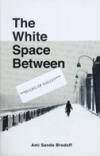The White Space Between
You could say this is a novel about the Holocaust. You could say this is a story about secrets and the past, control and acceptance, love and emptiness. And The White Space Between is all these things, but, above all else, Ami Sands Brodoff has crafted a tale of ancestry and the familial bond.
You could say this is a novel about the Holocaust. You could say this is a story about secrets and the past, control and acceptance, love and emptiness. And The White Space Between is all these things, but, above all else, Ami Sands Brodoff has crafted a tale of ancestry and the familial bond.
The novel has two main characters: Jana Ivanova, octogenarian and Holocaust survivor; and Willow Ives, her middle aged, puppeteer daughter. Both women live lives somewhat estranged from the outside world. Jana runs from her horrific past, and in an attempt to shield her daughter from the ills she herself suffered, she inadvertently brings upon Willow many of the same traumas. Willow doesn’t want to accept her mother’s tight-lipped version of her life during and even after she escaped death during the Holocaust, but she never presses the subject, afraid that her volatile but gentle mother is too fragile. Because Jana never accepts her past, Willow is then stuck with the same past trailing behind her like a dark secret. This shadow forces Willow into a world that is safer, lighter and more predictable.
In one of the first chapters, the narrator says, “[Willow] loves this miniature world she can hold, whole, within her eye, unlike the real one, which never makes sense in its ever-changing, shifting fragments.” Although Willow has a strong bond with her mother, she has created for herself another family in an imaginary world. The relationship Willow has with her puppets is beautiful, and one of the greatest strengths of the novel. The reader learns more about Willow in these interactions than in any other part of the novel.
The quirky discussions with her “family” are the heart of the originality of the novel. In one scene, Willow is surprised by a man at her door, and unused to attention, she freezes. “Her favorite puppets stare at her, wondering what she’ll do . . . Ernestine, Lise, Trevor, Mr. G. and Alphonse are gossiping about her, at first softly, then in a roar . . . Her favorite five burst into a cacophony of laughter, mocking, delighted.” Later, Willow remarks, embarrassed, to the man, “Sorry. I’m talking to myself – selves.”
Unfortunately there are too few of these highly energized and unique insights into Willow’s life. Too often, the windows into Willow’s personality feel forced, especially concerning the omniscience of the narrator, who should be able to show us who Willow is without the strained epiphanies. They don’t flow with the character or the novel in the same delightful way that her life with her puppets does. For example, Brodoff writes, “Willow thinks of fire’s double-edged nature, fire needs a special place – a fireplace. She is a little afraid of her own fire, not to mention other people’s.” It feels very awkward, and the declaration isn’t followed through with in the rest of the novel. Willow is very hard to get a grasp on as a main character. At times she seems shy, particularly around men, and then she is suddenly stripping off her clothes on the beach. The reader has a difficult time making a connection with Willow. While Willow’s character is inconsistent, I will concede the fact that Brodoff does seem to specifically write Willow so that we learn the most about who she is when she is alone with her puppets, when she feels most comfortable being herself.
Brodoff does also make it clear, through explicit narration and through the characters’ thoughts and behaviors, that neither Willow nor Jana understand where they belong. Referring to the poetry of Marina Tsvetaeva, Willow says, “it’s like she’s writing about the pull toward an empty space where there should be something. I feel that.” And Jana refers to all and none of Prague, Montreal and New Jersey as home. Similarly, Willow is engulfed in the historic presences of her ancestors in Prague, but she grew up in New Jersey, finally settling down during her adult life in Montreal. Jana’s disappointing return to Prague towards the end of the novel is mirrored by Willow’s return to her childhood home in New Jersey: “Willow craves the familiar, but the house is strange.” Neither woman quite understands the old cliché: Home is where the heart is.
At the end of the novel, both women have learned to accept who they are and, more importantly, where they came from. Willow has learned the meaning of home, naming her newest puppet show, Family Strings, and while not completely letting go of her puppet family, she does add one more familial voice to her head: “She is carrying on a conversation with her mother in her mind, as she does with her puppets . . . her mother speaking directly into her ear.”





